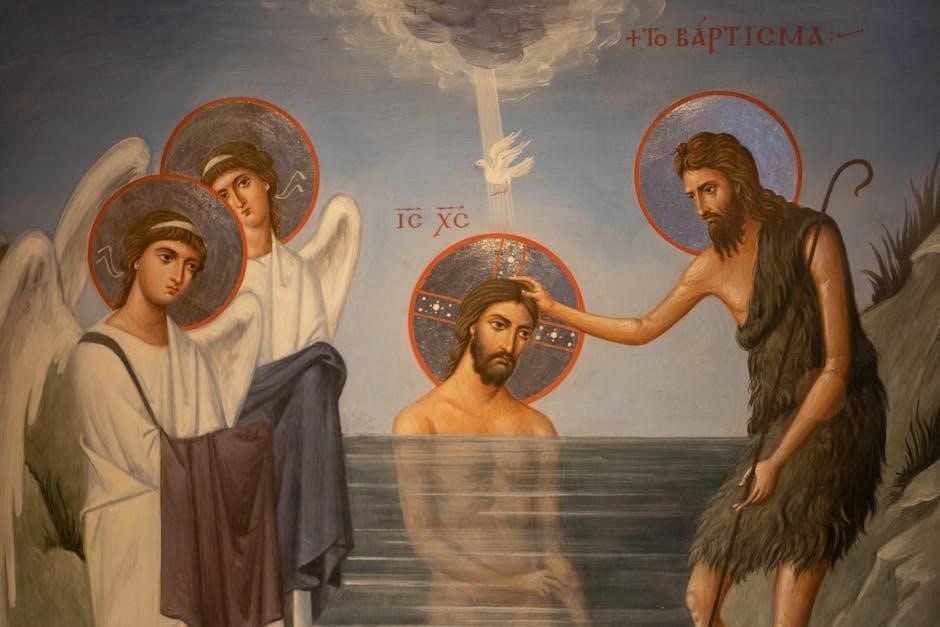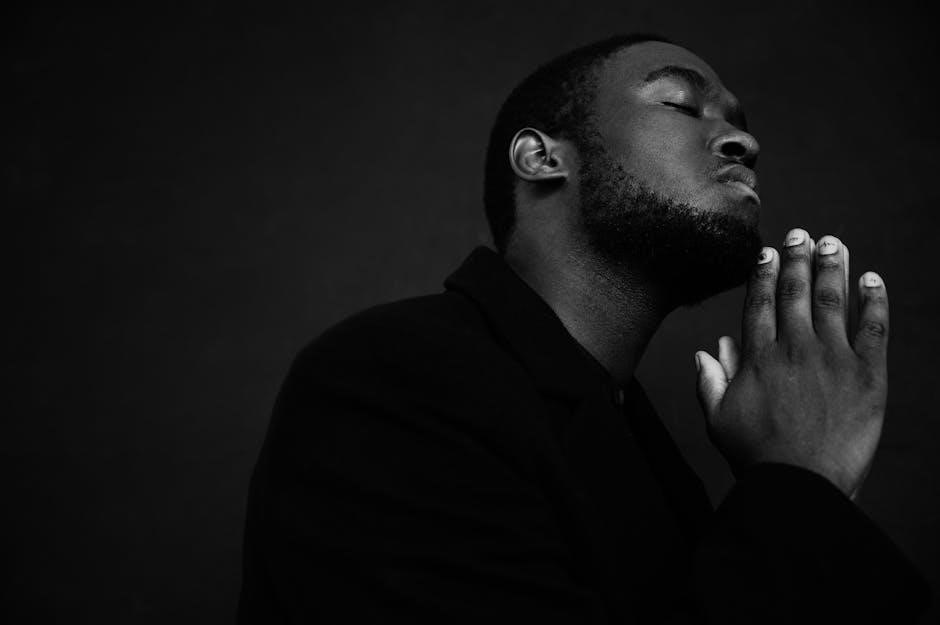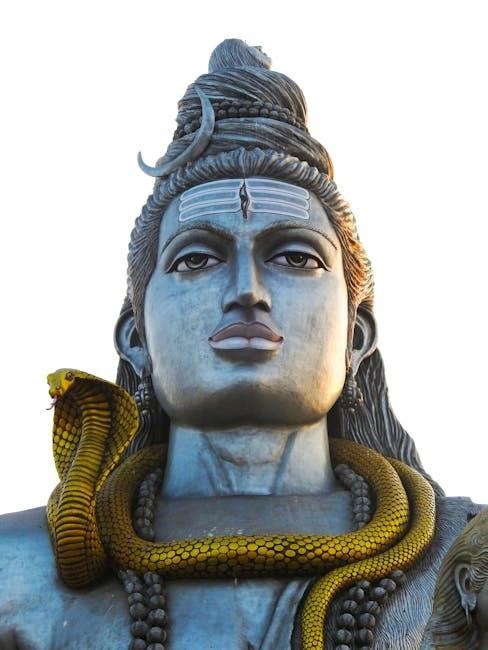Yasmina Reza’s God of Carnage, translated by Christopher Hampton, is a dark comedy exploring human nature and social facades. The PDF version offers convenient access to this acclaimed play.
Overview of the Play
God of Carnage, written by Yasmina Reza and translated by Christopher Hampton, is a dark comedy that explores the breakdown of civility. The play follows two couples, the Novaks and the Raleighs, who meet to discuss a fight between their children. What begins as a polite conversation escalates into a chaotic revelation of their true selves. Set in a minimalist living room, the play strips away social pretenses, revealing the raw, primal instincts beneath. Its sharp dialogue and intense character dynamics make it a gripping 90-minute exploration of human nature and the thin line between civilization and chaos.
Importance of the PDF Format
The PDF format of God of Carnage offers unparalleled convenience and accessibility. It allows readers to access the play on multiple devices, making it ideal for students, researchers, and theater enthusiasts. The PDF preserves the original formatting, ensuring a seamless reading experience. Its popularity stems from its ease of sharing and cost-effectiveness, enabling widespread dissemination. This format has made Yasmina Reza’s work more accessible globally, contributing to its enduring popularity and academic study. The PDF version remains a preferred choice for those seeking a portable and high-quality copy of this award-winning play.

Yasmina Reza and Her Work
Yasmina Reza is a renowned French playwright and novelist, celebrated for her sharp wit and insightful exploration of human nature. Her works, like God of Carnage, have gained international acclaim for their thought-provoking themes and nuanced dialogue, making her one of the most respected voices in contemporary theatre.
Biography of Yasmina Reza
Yasmina Reza, born in 1959 in Paris, France, is a celebrated playwright, novelist, and actress. She rose to prominence with her sharp, insightful writings that delve into human relationships and societal norms. Reza’s work often explores themes of class, identity, and the complexities of human behavior. Her plays, such as Art and God of Carnage, have garnered international acclaim and numerous awards, including Tony Awards. Writing primarily in French, her works are widely translated, making her a global literary figure. Reza’s unique voice and ability to blend humor with profound introspection have solidified her place in contemporary theatre.
Key Themes in Her Plays
Yasmina Reza’s plays often explore the complexities of human nature, societal facades, and the duality between civilization and primal instincts. In God of Carnage, she delves into themes of violence, hypocrisy, and the breakdown of social norms; Her works frequently examine how individuals navigate relationships, power dynamics, and moral ambiguities. Reza’s sharp dialogue and nuanced characterizations reveal the underlying tensions in seemingly ordinary interactions. Her ability to blend humor with darker truths creates a compelling critique of modern society, making her plays both entertaining and thought-provoking. These themes resonate deeply, reflecting universal human struggles and contradictions.

God of Carnage PDF Availability
The God of Carnage PDF is widely available for free download, offering convenience and accessibility to readers worldwide, making it a popular choice for students and researchers alike.
Where to Download the PDF
The God of Carnage PDF can be downloaded from various online platforms, including educational websites, digital libraries, and forums dedicated to theater and literature. Many sites offer free access to the script, making it easily accessible for students, researchers, and theater enthusiasts. Additionally, platforms like Scribd and SlideShare often host the PDF, allowing users to view or download it conveniently. Some websites may require registration or subscription for access, while others provide it freely. Ensure to use reputable sources to avoid unauthorized or corrupted files.
Popularity of the PDF Version
The PDF version of God of Carnage has gained significant popularity due to its convenience and accessibility. Readers appreciate the ability to download and view the play on various devices, making it ideal for study, research, or casual reading. The format preserves the play’s structure and dialogue, ensuring an authentic experience. Its widespread availability on platforms like Scribd and educational forums has further boosted its appeal. The PDF’s popularity also stems from its ease of sharing and the growing preference for digital content among theater enthusiasts and students of literature.

Plot and Characters
The play revolves around two couples meeting to discuss a conflict between their children, revealing their true selves and societal masks through sharp dialogue and escalating tension.
God of Carnage by Yasmina Reza follows two couples, the Novaks and the Raleighs, who meet to discuss a conflict between their children. Set in a bourgeois living room, the play strips away societal facades, revealing raw human emotions. The dialogue-driven narrative escalates tensions, exposing the characters’ true selves. As civility crumbles, their civilized masks fall, unveiling primal instincts and hypocrisy. The play delves into themes of violence, morality, and the thin line between composure and chaos, ultimately questioning whether adulthood truly tames humanity’s savage nature. This dark comedy masterfully explores the contradictions of modern society through sharp wit and unflinching honesty.
Character Analysis
In God of Carnage, Yasmina Reza crafts four complex characters whose true selves emerge as civility crumbles. Veronica Novak, a cultured homemaker, hides her controlling nature behind sophistication, while her husband Michael, a hardware store owner, reveals a dark, primal humor. Annette Raleigh, seemingly poised, struggles with emotional instability, and her husband Alan, a self-absorbed lawyer, embodies cynical detachment. As tensions rise, their masks fall, exposing hypocrisy, flaws, and primal instincts. The play masterfully unravels the characters’ layers, revealing how quickly civilized individuals revert to their baser selves when societal expectations no longer constrain them. This transformation highlights the universality of human frailty and the thin veneer of modern morality.

Themes in God of Carnage
God of Carnage delves into themes of human nature, societal facades, and latent violence. It explores how civil behavior crumbles, revealing primal instincts and hypocrisy beneath.
Exploration of Human Nature
God of Carnage masterfully explores human nature by stripping away societal facades, revealing primal instincts and hypocrisy. The play depicts two couples meeting to discuss their children’s conflict, but civility crumbles, exposing selfishness, violence, and raw emotions. Through sharp dialogue and escalating tension, Yasmina Reza unveils how civilized individuals regress to primal behavior when faced with conflict. The bourgeoisie setting contrasts with the characters’ savage instincts, highlighting the thin line between order and chaos. This exploration is both unsettling and thought-provoking, offering a mirrored reflection of human frailty and the duality of modern life.
Violence and Civilization
God of Carnage delves into the paradox of violence within civilized society. The play portrays two couples navigating a conflict between their children, but their seemingly polite discussion descends into chaos. Reza highlights how societal norms mask innate primal tendencies, as the characters’ civility erodes, revealing raw aggression. The tension escalates, exposing emotional and verbal violence, blurring the line between refinement and savagery. This stark contrast underscores the fragility of civilization and the ease with which individuals revert to primal behavior when faced with conflict. The play serves as a chilling reminder of the violence lurking beneath polished exteriors.

Script and Structure
God of Carnage features a tightly structured script, focusing on real-time dialogue between four characters. Its minimalistic format amplifies tension, emphasizing sharp exchanges and escalating conflict.
Play Structure and Dialogue
The play is structured as a single, intense scene, focusing on real-time dialogue between four characters. The script’s tight format heightens tension, with sharp, realistic exchanges revealing deeper truths. Yasmina Reza’s dialogue is precise, capturing the escalation of conflict and the stripping away of social masks. The minimalistic setting—just a living room—amplifies the psychological dynamics. Each line propels the story forward, exposing the characters’ true nature. The absence of elaborate stage directions allows the dialogue to dominate, creating a visceral experience. This structure ensures the audience remains fully engaged in the unfolding chaos, making the play both gripping and thought-provoking.

Performances and Adaptations
The play has had successful global runs, noted for its sharp wit, with prominent productions and translations, like Christopher Hampton’s English version, enhancing its acclaim.
Famous Productions
God of Carnage has captivated audiences worldwide with its sharp wit and intense dialogue. The 2009 Broadway production, starring Jeff Daniels and Janet McTeer, won critical acclaim and a Tony Award. In London’s West End, the play also garnered praise for its biting humor and stellar performances. Directed by Matthew Warchus, it featured notable actors like Simon Russell Beale and Mark Strong. The play’s success extended globally, with productions in France, Germany, and other countries, cementing its reputation as a modern theatrical masterpiece. Its ability to resonate universally has made it a favorite among both audiences and critics.
Translations and Interpretations
Originally written in French as Le Dieu du Carnage, Yasmina Reza’s play was masterfully translated into English by Christopher Hampton. This translation preserved the sharp dialogue and nuanced humor, ensuring global audiences could connect with its themes. The play has since been translated into multiple languages, reflecting its universal appeal. Its exploration of human nature and societal norms transcends cultural boundaries, making it a favorite for international productions. The availability of the PDF version in various translations has further enhanced its accessibility, allowing readers worldwide to engage with Reza’s insightful commentary on civilization and human behavior.
Reception and Reviews
Yasmina Reza’s God of Carnage won the 2009 Tony Award for Best Play, praised for its dark humor and sharp dialogue. Audiences and critics alike celebrated its biting exploration of human nature, making it a theatrical triumph.
Audience Response
God of Carnage captivated audiences with its biting humor and raw portrayal of human nature. Theaters worldwide reported sold-out performances, as spectators found themselves both entertained and uncomfortably reflected in the characters. The play’s ability to balance comedy with darker themes resonated deeply, sparking vivid discussions. Many praised its relatable yet unflinching look at societal norms, while others appreciated its concise, intense structure. The audience’s strong connection to the characters’ flaws and hypocrisies highlighted the play’s enduring relevance, making it a memorable experience for theatergoers across the globe.
Critical Acclaim
God of Carnage garnered widespread critical acclaim for its sharp dialogue and profound exploration of human behavior. Critics praised Yasmina Reza’s mastery in crafting a play that seamlessly blends humor with biting social commentary. The Tony Award-winning production was lauded for its minimalist design and the actors’ performances, which brought depth to the complex characters. Reviewers highlighted the play’s ability to provoke thought while maintaining an engaging narrative. Its universal themes and precise structure solidified its place as a modern theatrical masterpiece, earning it a reputation as a must-see production in contemporary theater.

